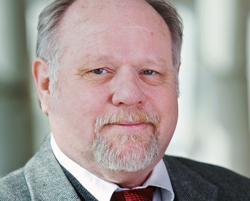UNMC researcher R. Lee Mosley, Ph.D., answers questions about his work, life and interests.
 |
Lee Mosley, Ph.D. |
- Name: R. Lee Mosley, Ph.D.
- Title: associate professor of pharmacology and experimental neuroscience
- Joined UNMC: August 1998
- Hometown: Midwest City, Okla.
Describe your research in laymen’s terms.
Parkinson’s disease is caused from the death of neurons that regulate movement; however, why these neurons preferentially die is unknown. Inflammation and misfolded proteins are thought to play pivotal roles in the death of those neurons. We have found that different types of immune system T cells can either dampen or amplify these inflammatory responses, which in turn, decrease or increase neuronal death. Our research focuses on how these T cells participate to increase or decrease inflammation and the death of the neurons associated with Parkinson’s disease.
How does your research contribute to science and/or health care?
Our research attempts to delineate critical immune mechanisms that are important to Parkinson’s disease progression. The ultimate goal is to use these mechanisms to develop therapeutic vaccines or treatments that act in the brain to control inflammatory responses, clear misfolded proteins and protect neurons that are otherwise destined to die in Parkinson’s disease patients.
Name someone at UNMC who provides vital contributions to your success and briefly describe how they help you.
Howard Gendelman, M.D., Larson Professor of Internal Medicine and Infectious Diseases and chairman of the department of pharmacology and experimental neuroscience, has been instrumental, not only as a mentor who believed in my scientific potential and helped to establish my career, but also as a perceptive collaborator.
List three things few people know about you.
- I married my junior high sweetheart. We have been married for 34 years, but have been a couple for 42 years.
- I wore the “tools of ignorance” playing baseball in the hot Oklahoma summers of my youth.
- I began college on a music scholarship before seeing the light and switching to science.